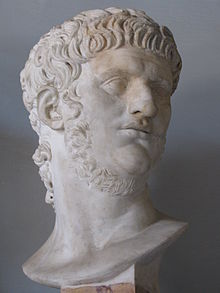In 64, most of Rome was destroyed in the Great Fire of Rome, which many Romans believed Nero himself had started in order to clear land for his planned palatial complex, the Domus Aurea. In 68, the rebellion of Vindex in Gaul and later the acclamation of Galba in Hispania drove Nero from the throne. Facing assassination, he committed suicide on 9 June 68.[3] His death ended the Julio-Claudian Dynasty, sparking a brief period of civil wars known as the Year of the Four Emperors. Nero's rule is often associated with tyranny and extravagance.[4] He is known for many executions, including those of his mother[5] and the probable murder by poison of his stepbrother, Britannicus.
He is infamously known as the Emperor who "fiddled while Rome burned", although this is now considered an inaccurate rumor,[6] and as an early persecutor of Christians. He was known for having captured Christians burned in his garden at night for a source of light. This view is based on the writings of Tacitus, Suetonius, and Cassius Dio, the main surviving sources for Nero's reign. Few surviving sources paint Nero in a favorable light.[7] Some sources, though, including some mentioned above, portray him as an emperor who was popular with the common Roman people, especially in the East.[8] The study of Nero is problematic as some modern historians question the reliability of ancient sources when reporting on Nero's tyrannical acts.[9]
Reign
13 October 54 – 9 June 68
Full name
Birth to adoption: Lucius Domitius Ahenobarbus
Adoption to accession: Nero Claudius Caesar Drusus Germanicus
As Emperor: Nero Claudius Caesar Augustus Germanicus
Born
15 December 37
Birthplace
Antium, Italy
Died
9 June 68 (aged 30)
Place of death
outside Rome
Buried
Mausoleum of the Domitii Ahenobarbi, Pincian Hill, Rome
Predecessor
Claudius
Successor
Galba
Consort to
Claudia Octavia
Poppaea Sabina
Statilia Messalina
Offspring
Claudia Augusta
Father
Gnaeus Domitius Ahenobarbus
Mother
Agrippina the Younger
In 64, most of Rome was destroyed in the Great Fire of Rome, which many Romans believed Nero himself had started in order to clear land for his planned palatial complex, the Domus Aurea. In 68, the rebellion of Vindex in Gaul and later the acclamation of Galba in Hispania drove Nero from the throne. Facing assassination, he committed suicide on 9 June 68.[3] His death ended the Julio-Claudian Dynasty, sparking a brief period of civil wars known as the Year of the Four Emperors. Nero's rule is often associated with tyranny and extravagance.[4] He is known for many executions, including those of his mother[5] and the probable murder by poison of his stepbrother, Britannicus.
He is infamously known as the Emperor who "fiddled while Rome burned", although this is now considered an inaccurate rumor,[6] and as an early persecutor of Christians. He was known for having captured Christians burned in his garden at night for a source of light. This view is based on the writings of Tacitus, Suetonius, and Cassius Dio, the main surviving sources for Nero's reign. Few surviving sources paint Nero in a favorable light.[7] Some sources, though, including some mentioned above, portray him as an emperor who was popular with the common Roman people, especially in the East.[8] The study of Nero is problematic as some modern historians question the reliability of ancient sources when reporting on Nero's tyrannical acts.[9]
Reign
13 October 54 – 9 June 68
Full name
Birth to adoption: Lucius Domitius Ahenobarbus
Adoption to accession: Nero Claudius Caesar Drusus Germanicus
As Emperor: Nero Claudius Caesar Augustus Germanicus
Born
15 December 37
Birthplace
Antium, Italy
Died
9 June 68 (aged 30)
Place of death
outside Rome
Buried
Mausoleum of the Domitii Ahenobarbi, Pincian Hill, Rome
Predecessor
Claudius
Successor
Galba
Consort to
Claudia Octavia
Poppaea Sabina
Statilia Messalina
Offspring
Claudia Augusta
Father
Gnaeus Domitius Ahenobarbus
Mother
Agrippina the Younger
Family Members
Advertisement
Records on Ancestry
Sponsored by Ancestry
Advertisement






